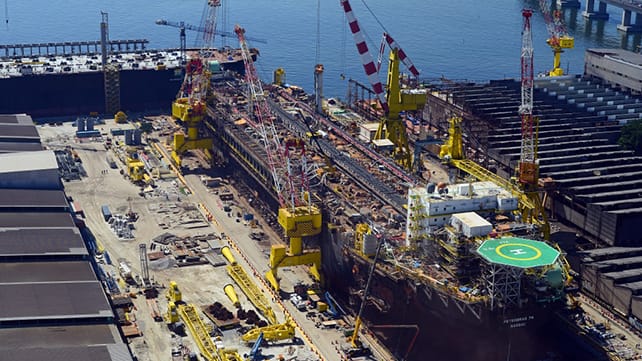
With industry partners involved in Lava Jato, the shipbuilding industry operates with low capacity and without large orders
That marine industry is going through its worst crisis we all know. We are feeling in the worst way what corruption schemes, administrative improprieties and lack of long-term investments cause to the economy of a sector, institution or country. In the next few, we will briefly cover what is happening and why we are taking so long to get out of this endless chaos that plagues the branch of Oil and Gas, but specifically the naval sector, which is the main topic of today's article.
The naval sector was already a milestone in Brazil's economic growth in the 70s, but today, it seems that we are far from repeating this milestone. Currently, we have 40 shipyards in the country, 12 of which are out of order and the rest have almost no services due to lack of orders and little cash for large investments. This is a reflection of executives in this sector involved in corruption schemes deferred by Lava Jato. From that time, what's left today is just 50 workers and a debt that runs into the billions. These data were provided by Sinaval (Sindicato Nacional da Indústria Naval).
Of the shipyards that are still operating, some are still building barges or catamarans. The sector dedicated to the construction and assembly of rigs and ships, which was conceived precisely to meet the needs of Petrobras, has its time expired due to projects that are being finalized, which should not take more than 2 months of service. After that, there will be more shipyards that add up negatively to this operational inactivity statistic.
It was on Lula's government that the excitement to invest in shipyards began shortly after the pre-salt layer was found by Petrobras. After that, a lot of projects began to appear along the coast of Brazil, with a government campaign that would create jobs for "God Will Give" and would take the Brazilian economy to the skies. In 2007, the Merchant Navy, public and private banks disbursed a whopping R$45 billion to finance around 90% of these projects.
Despite some projects being delayed in 2014, everything was smooth. Many people were employed, around eighty-two thousand people and we had production at full speed. But when the lava Jato arrived at Petrobras my dear reader, it was a true Tsunami! Oil prices plummeted and ship orders were cancelled.
In an attempt to reduce the damage, Petrobras asked the ANP to lower the taxable percentages of local content, claiming that it makes operating costs more expensive by 40%.
Returning to the shipyards, it turns out that the crisis came at a time when they were investing millions in investment in training and qualification of operational contingents. We take as an example the company Enseada do Paraguaçu, which is associated with the companies Odebrecht, OAS and UTC, precisely those involved in Lava Jato. With a colossal waste of investment, the shipyard is at a standstill with only 18% left to complete the works due to legal issues.
The reflection of the crisis in people's lives
Jorge Fonseca, 46 years old, is one of the thousands of people suffering from the crisis in the shipbuilding industry. She left Rio to try her luck at Ecovix and its shipyard in Rio Grande, but was sent away along with 3 workers after Petrobras terminated the contract.
In Rio de Janeiro, Jorge's wife, Maria Angélica, has already worked in a bank, in telemarketing and in the pharmaceutical sector. In Rio Grande, she can't even be a store or supermarket cashier. Occasionally, a cleaning service appears, even so, they have the help of their son who lives in RJ and neighbors.
Are you also experiencing these difficulties? Use the comments field below to leave your opinion. enjoy our FAN PAGE It's ours Official Group









Unfortunately, MMAA armed watermelons are more…
I would like to know what planet you live on…
Sensationalist and silly material. Just make…
I'm looking for offshore positions...
Great show but it should be accessible…
With that engine there (109 hp)? Difficultly…
I hope the contract is not signed, I have…
Congratulations on the article that only highlights the…